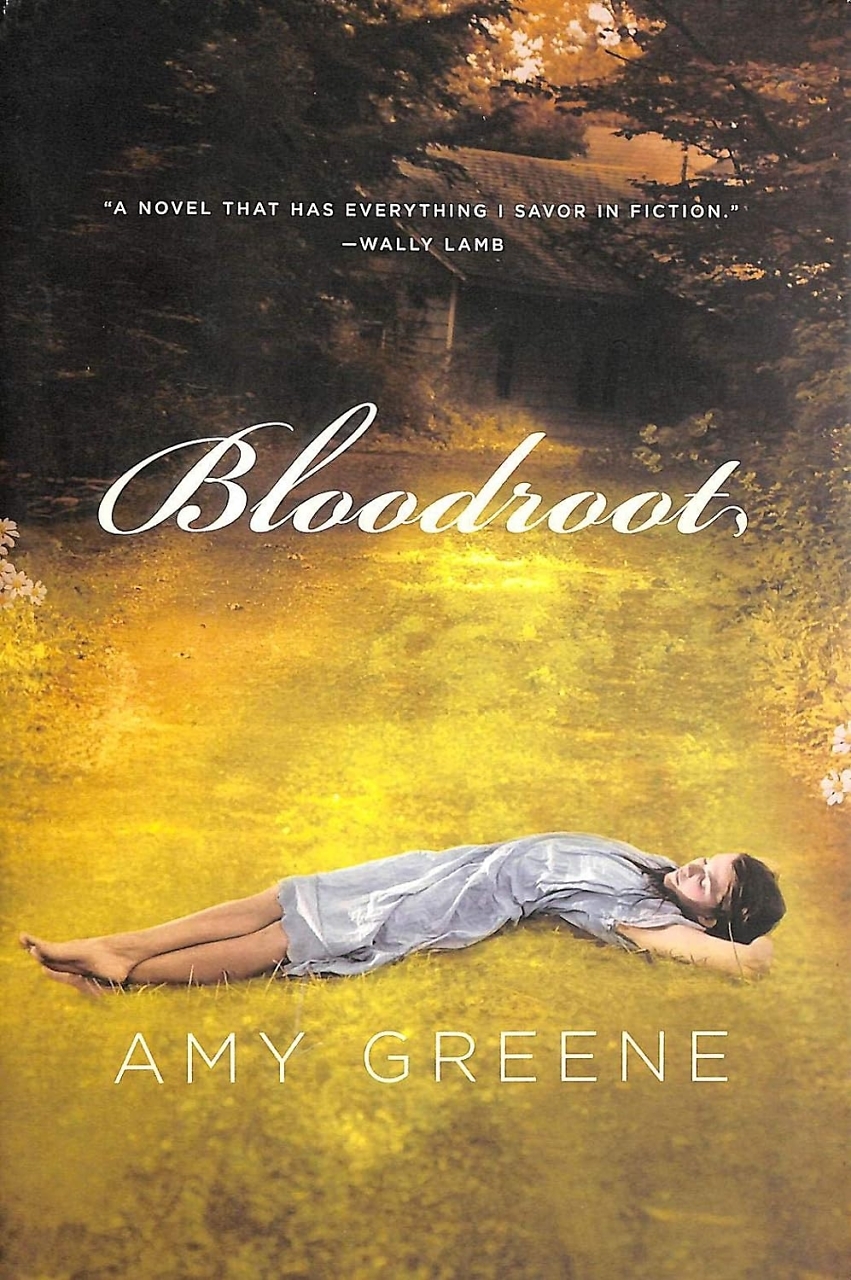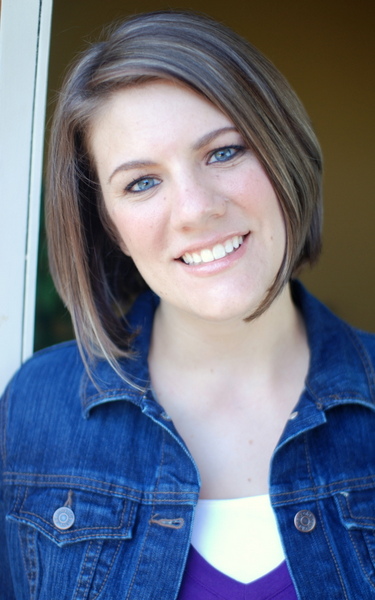An Opry Home Companion
With A Guitar and a Pen Old Time Radio Hour, novelist Robert Hicks has created a live broadcast that just might save the printed word
Two nights before the rapture, I found myself at Puckett’s Grocery, a friendly meat-and-three restaurant in Franklin, risking literary enchantment. Robert Hicks, bestselling author of The Widow of the South and A Separate Country and the evening’s host, has started a weekly radio show in which he interviews musicians and an author. So far the shows are pilots, which Hicks hopes will be picked up by a radio station. It’s a seriously entertaining, smart concept, but one that doesn’t take itself too seriously. (Hicks also claimed, as his ancient retriever was being led out the back door, that Jake the dog was really the “megastar of the show.”) The show’s name, A Guitar and a Pen Old Time Radio Hour with Robert Hicks, comes from an anthology Hicks edited in 2008. A Guitar and a Pen features essays by artists like Marshall Chapman, Kris Kristofferson, and Vince Gill. Back in March, in fact, both Chapman and Gill appeared as Hicks’s first “Guitar and a Pen” guests.
That show also included a Goo Goo Cluster-eating contest, which seemed like an appropriate thing to do if, in fact, the end was actually nigh. In light of the buzz about redemption, it was hard not to consider the apocalyptic state of book publishing. The last time I stepped into Borders, before its doors were shuttered this month, everything but the paint had been stripped, and an employee complained bitterly that a customer had used the public elevator as a bathroom. Visiting a bookstore used to feel, to me, as sacred as visiting a church, only better—like visiting a place of worship that everyone in the world agreed was sacrosanct. Now, amid sunken sales and grim prospects, booksellers and readers alike have dwindled down and down and down. Only the true believers are left, and we show up for readings and interviews and book signings the way Harold Camping’s radio-show listeners were, at that very moment, preparing to ascend together to heaven. Puckett’s, last Thursday evening, had the feeling of a festive, pie-laden vigil. In the full restaurant, a crowd of about sixty people, I was seated next to the open-faced cooler. Along with strawberries, purple grapes, baskets of lemons and limes, and sodas in glass bottles, sat thick slices of maple pecan and chocolate chess pie (both blue-ribbon winners at the state fair).
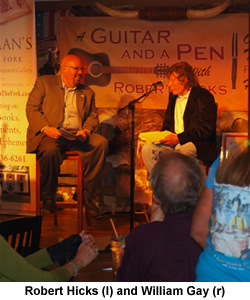 Several years ago, Hicks began to be approached on a monthly basis by Mary Pearce, executive director of the Heritage Foundation of Franklin and Williamson County. She wanted him to create a radio show like Garrison Keillor’s A Prairie Home Companion for the Franklin Theatre. “At each offer, I turned her down,” Hicks said in an interview, but “after almost a year, I began to ask myself why I was turning her down. After all, what she was suggesting was to give me a weekly, hour-long platform to promote all the things I have been promoting all along: Franklin, Williamson County, Civil War preservation, writers, songwriting, and all the rest.”
Several years ago, Hicks began to be approached on a monthly basis by Mary Pearce, executive director of the Heritage Foundation of Franklin and Williamson County. She wanted him to create a radio show like Garrison Keillor’s A Prairie Home Companion for the Franklin Theatre. “At each offer, I turned her down,” Hicks said in an interview, but “after almost a year, I began to ask myself why I was turning her down. After all, what she was suggesting was to give me a weekly, hour-long platform to promote all the things I have been promoting all along: Franklin, Williamson County, Civil War preservation, writers, songwriting, and all the rest.”
Keillor, Hicks explained, “has often repeated the story that A Prairie Home Companion was created in his mind as he sat in the Confederate Gallery of the Ryman [Auditorium], watching the Opry. His thought was, ‘This could be taken and adapted anywhere!’ All I am doing is bringing it back to Middle Tennessee.” With its roots in the Opry, A Prairie Home Companion, and Thacker Mountain Radio out of Oxford, Mississippi, A Guitar and a Pen felt, even before it started, like something that’s been around longer than a few weeks.
“Can I borrow a chocolate milk?” Hicks asked, moments before taking the stage with novelist William Gay, thirty minutes late. The woman next to me had ordered a barbecue sandwich, meat piled in between two pancakes. I was tempted to ask her for a bite; we were strangers, that’s true, but it’s also true that we were strangers at an author event, so I assumed we already shared certain core values.
Gay looked exactly the way one might imagine a reclusive, rural, late-blooming genius would look. He drained the last of his Bud Light and perched on a barstool, speaking softly enough so that the audience leaned in toward him: “I knew from the time I was twelve or thirteen what I wanted to do,” he told Hicks, explaining that reading Tom Wolfe had “reordered” his universe. “My parents, I don’t think they quite had me figured out. I think they probably thought it was a little ridiculous for a kid to want to write books. They didn’t criticize me, I just think they thought it was weird.”
“Been there,” Hicks said, to laughter.
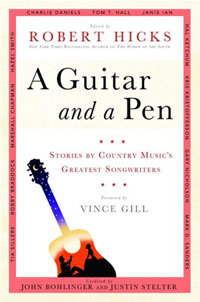 Before the publication of his first book, in 1999 when he was fifty-five, Gay had “probably written at least three novels and parts of others.” The Michener Prize-winner shrugged, “It just never felt right, until The Long Home. I was trying to write about a bunch of stuff I didn’t know about. It was only when I started writing the people I knew that everything fell together. Everyone thinks they see themselves [in my books], but I just write types.” As for why he felt drawn to coming-of-age stories, Gay explained, “Young people and really old people are more interesting than people in between. And when you’re a kid, seventeen or eighteen years old, everything is up for grabs.”
Before the publication of his first book, in 1999 when he was fifty-five, Gay had “probably written at least three novels and parts of others.” The Michener Prize-winner shrugged, “It just never felt right, until The Long Home. I was trying to write about a bunch of stuff I didn’t know about. It was only when I started writing the people I knew that everything fell together. Everyone thinks they see themselves [in my books], but I just write types.” As for why he felt drawn to coming-of-age stories, Gay explained, “Young people and really old people are more interesting than people in between. And when you’re a kid, seventeen or eighteen years old, everything is up for grabs.”
While Gay read, I watched the woman seated across from me knit tiny squares of a baby blanket as he described the taste of a woman’s mouth as “affirmation of life.” At the end of his second, lengthy reading, Gay looked up from his yellow legal pad, covered with his own longhand writing. He shrugged and said, “That’s all I’ve got.”
Hicks compared being in Gay’s presence to being in the company of Faulkner and Flannery O’Connor, “except she would’ve never done this. She was a total recluse.” Gay perked up at the mention of O’Connor. “When I was kid,” he said, “I bought a thirty-five-cent copy of A Good Man is Hard to Find, and every story in it is really good.” Gay talks like that, making statements that are so plainly obvious they’re refreshing. And, he added, it was “probably impossible” not to be influenced by Faulkner.
On having two books made into films, Gay said, “I’m sort of ambivalent.” Of the first, That Evening Sun, he offered that Hal Holbrooke was “really good playing the old man.” He hasn’t yet seen Bloodworth, which was released in theaters last week. “But I got to talk to Kris Kristofferson.”
Next up at A Guitar and a Pen Old Time Radio Hour was thirty-year-old Holly Williams, a daughter of Hank Jr. whom Hicks introduced as “music royalty.” Before playing, she remarked, “I don’t know if it helps your writing when you finally get settled and peaceful. It probably slows you down. Kristofferson’s best songs were written when he was a mess.” After a song about her mother, Williams told a story about her older sister, Hilary, who’s written both a book and song entitled Sign of Life. In 2007, the sisters were in a car crash in which Hillary was pronounced dead before finally being revived. In the hospital she said, “I’m in so much pain, I’m in so much pain,” and her doctor replied, “Pain is a sign of life.” Williams finished with a cover of John Prine’s “Angel from Montgomery,” sparking Hicks to observe, “In a three-song set, you were able to cover divorce, death, and Jesus.”
During the book signing after the show, a man told Gay he likes the work of both Robert Penn Warren and Jim Harrison. “What have you done that’s most like that?” he asked. Gay answered, “I met Jim Harrison. He was chasing a college girl.”
The former lead singer of The Turtles, Mark Volman, wandered around Puckett’s in a tracksuit. He bought a signed book and, confirming with the server that he’d paid the check, said, “I don’t come here much but when I do, I drink.”
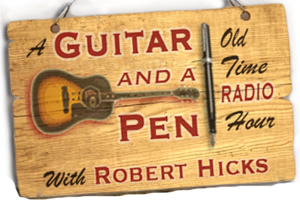 After the show, Gay seemed amped up on the energy and attention from the audience. “If I hadn’t been a writer, or trying to be a writer,” Gay told me, “I’d still be married. She thought it was ridiculous, a grown man scribbling in notebooks. I liked being married but I’d rather be a writer.”
After the show, Gay seemed amped up on the energy and attention from the audience. “If I hadn’t been a writer, or trying to be a writer,” Gay told me, “I’d still be married. She thought it was ridiculous, a grown man scribbling in notebooks. I liked being married but I’d rather be a writer.”
“While it has not been settled that we will be in the [Franklin] theatre,” Hicks told me as the crowd thinned out, “I believe the show will happen.” He was referring to A Guitar and a Pen Old Time Radio Hour, to the interest of radio stations and potential sponsors, but I couldn’t help but think of the whole industry surrounding the written word. As people made their way outside, where Jake the World’s Greatest Dog lay on the pavement like a sleeping lion, someone down the block started playing bagpipes. Only in Tennessee, I thought, and the song was “Amazing Grace.” Hicks held open the door. “The future is bright,” he said, and I believed him.
Another edition of “A Guitar and a Pen Old Time Radio Hour with Robert Hicks” will be taped at Puckett’s Grocery and Restaurant in Franklin on May 26 and will feature Eric Brace, Peter Cooper, Fayssoux Starling McLean, and Rodney Crowell. The show starts at 6 p.m. Cost is $15, and seating is limited. To make reservations, call 615-794-5527. To listen to the live stream online, click here at showtime.

